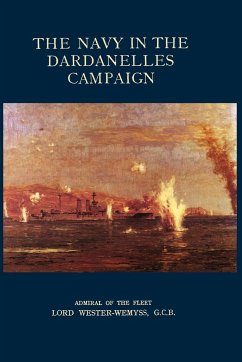The role of the Royal Navy in the Dardanelles campaign was heroic but as unhappy at sea as that of the Army was on land. The author of this account, Admiral Wester-Wemyss ( who later rose to be Britain's delegate at the signing of the Armistice in 1918) was an eye-witness on the spot. He describes the initial efforts to shell the Turkish fotresses along the Dardanelles straits into silence, and how those efforts were thwarted when British ships hit a series of mines. Thereafter, the Navy's principal role was to get the troops ashore at various landing sites on the Gallipoli peninsular - a task they carried out bravely, but which was hampered by the lack of landing craft. Wemyss spreads his sources net wide, using Admiral Sir Cecil Thursby' account of landing Anzac troops at Gaba Tepe, and Admirals Grasset and Guepratte's stories of the French navy's contribution to the campaign at Kume Kale. Wemyss also includes Captain Unwin of the River Clyde's account of how he won a VC landing soldiers from his ship despite a fierce enemy fusilade. This is a first-hand account of the somewhat neglected naval part of the Gallipoli operations.
Bitte wählen Sie Ihr Anliegen aus.
Rechnungen
Retourenschein anfordern
Bestellstatus
Storno








